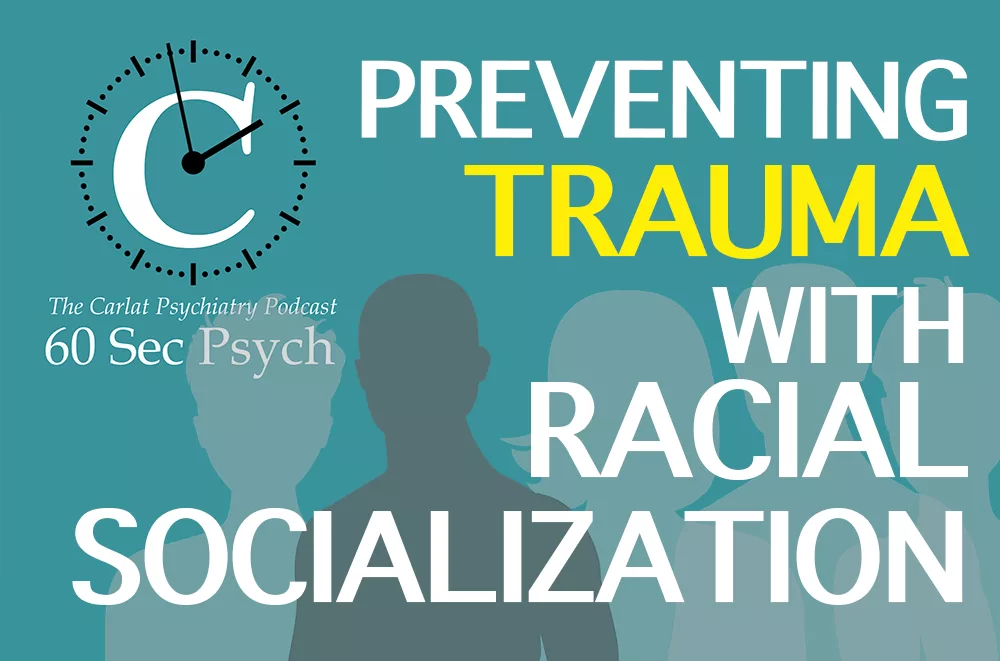Race-based traumatic stress affects mental health in young people of color. A 2019 paper in American Psychologist puts that racial socialization into a framework some listeners may be familiar with. [Link]
Published On: 7/25/20
Duration: 5 minutes, 51 seconds
Transcript:
Dr. Feder: Today on 60 Second Psych: Preventing Trauma with Racial Socialization. Take it away Mara.
Mara: Race-based traumatic stress affects mental health in young people of color. That trauma comes from discriminatory racial encounters like incidents at school, racial profiling, and police killings in the news. These traumatic events are amplified online and pervasive in young peoples’ lives.
As a result, families have taught their kids about racial dynamics at an early age as a coping method. It’s called racial socialization.
A 2019 paper by in American Psychologist puts that racial socialization into a framework some listeners may be familiar with. It’s a racially specific complement to Lazarus and Folkman’s transactional model of stress and coping (TMSC). The authors call it Racial Encounter Coping Appraisal and Socialization Theory (RECAST).
They illustrate the framework with this story:
Tyquan Brehon is a Black high school student who was stopped by police around 60 times during New York City’s controversial “stop and frisk” policy. His story was covered in a 2012 New York Times documentary called "The Scars of Stop-and-Frisk."
The first time he was stopped, he was confused because he thought that you had to actually do something illegal to be stopped by police. As he was stopped more and more, he realized that the stops were racial profiling.
Tyquan described the stops in an interview saying “you feel violated” and “it’s embarrassing because they do it in front of everybody,” and “it’s kind of scary too ... your heart’s beating.” It got to the point where Tyquan didn’t want to go to school because of all the police on the way there and even in the school itself. Instead he stayed home, isolated himself from his friends.
His parents weren’t helpful because they would ask him what he was doing to get stopped by the police. They wouldn’t accept that Tyquan wasn’t doing anything wrong. The way things finally improved was when Tyquan talked about the stops with Drew, his teacher from a previous high school. Drew had similar experiences with the police. Tyquan and Drew processed these experiences together. They cried after indicating how fearful and painful (clearly traumatic) these encounters were.
Tyquan began learning about the stop-and-frisk policy, and learning he wasn’t alone. As he said in the documentary: “A lot of people don't step up and say something because they're scared ... but I did the documentary to get people to actually step up and tell their stories. If we all come together, we can make change.”
From a psychological perspective, you can see how that shared experience with his teacher helped Tyquan understand that he was not alone. It opened doors to him not only understanding the situation, but also confidence that he could do something about it.
This process is called racial socialization, and the authors’ RESET model breaks it down into these elements:
- Racial stress appraisal - It took a few stops for Tyquan to realize he was being targeted because he was Black. Early on, he was internalizing that it could be something about him or something he did.
- Racial socialization competency - Tyquan’s parents were not prepared to help in this situation. Tyquan’s teacher could listen, and share his experiences, and put the encounters in context to help Tyquan better understand what was happening.
- Reappraisal - Tyquan developed the ability to reappraise and resolve this racial stress by talking about it with his teacher and getting a better understanding of stop-and-frisk.
- Racial coping self-efficacy - He gained confidence in his ability to resolve racially stressful encounters by making conscious decisions (not stress-related reactions) based on the encounters. He learned more about the stop-and-frisk policy causing his stress, and was empowered to tell his story to help others.
- Resolution and Outcome. As a result, Tyquan saw improved long-term behavioral, cognitive, emotional, and social outcomes. related to the ways Drew and others socialized and supported him.
An essential part of coping is helping individuals recognize what is happening internally with their emotions, and externally with the traumatic encounter. The socialization aspect is key as well. The trauma shared by a group of people, so the individual has an opportunity to not feel isolated and alone.
The authors present a more in-depth look at these elements, and I encourage you to take a look at their paper. It’s free online and linked in the description, along with Tyquan’s documentary.
Got feedback? Take the podcast survey.


_-The-Breakthrough-Antipsychotic-That-Could-Change-Everything.webp?t=1729528747)



